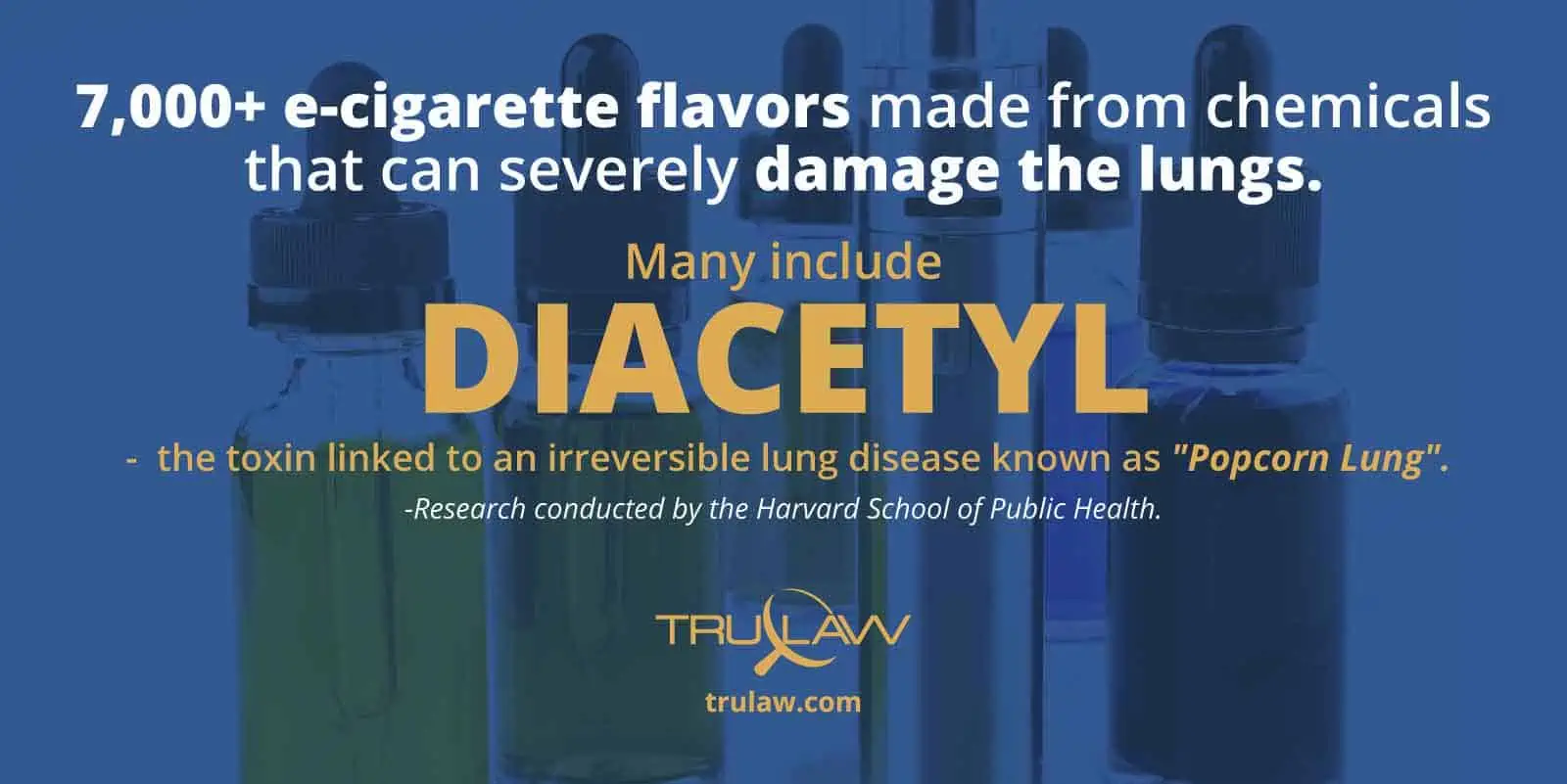What Draws Young People to E-Cigs?
- Last Updated: August 10th, 2023

Attorney Jessica Paluch-Hoerman, founder of TruLaw, has over 28 years of experience as a personal injury and mass tort attorney, and previously worked as an international tax attorney at Deloitte. Jessie collaborates with attorneys nationwide — enabling her to share reliable, up-to-date legal information with our readers.
Legally Reviewed
This article has been written and reviewed for legal accuracy and clarity by the team of writers and legal experts at TruLaw and is as accurate as possible. This content should not be taken as legal advice from an attorney. If you would like to learn more about our owner and experienced injury lawyer, Jessie Paluch, you can do so here.
Fact-Checked
TruLaw does everything possible to make sure the information in this article is up to date and accurate. If you need specific legal advice about your case, contact us by using the chat on the bottom of this page. This article should not be taken as advice from an attorney.
What Draws Young People to E-Cigs?
Use of electronic nicotine delivery devices, including E-Cigs, has been growing rapidly in the last few years, particularly among young people.
According to the Center for Disease Control and Prevention (CDC), three million middle and high school students are current users of e-cigarettes, up from 2.5 million in 2014.
Previous research has shown that teenagers who try e-cigarettes may be more than twice as likely to try conventional cigarettes as opposed to adolescents who have never tried the devices.

Table of Contents
The Lure of E-Cigs
In 2013, a team of Yale researchers surveyed Connecticut middle and high school students who used e-cigarettes and asked them what originally attracted them to the devices.
They said they were initially drawn to vaping for several reasons:
- Curiosity
- Different flavors offered
- Use by friends
- Low cost
- A desire to quit smoking regular cigarettes
When the researchers returned six months later to see who was still using e-cigarettes, the students who had said they were initially attracted to e-cigarettes because they wanted to quit smoking traditional cigarettes were actually 14 times more likely to still be vaping.
The results of the study were recently published online in the journal Pediatrics.
Different Flavors = Diacetyl
While many in the vaping/E-cigarette industry deny the use of diacetyl in their products, there are no regulations to restrict them from using it to make the flavored E-juice.
Diacetyl is a chemical that gives many food products its distinctly butter-like flavor.
Although many organizations continue to petition the FDA to change their treatment of diacetyl, as of today, manufacturers are still able to refer to products using diacetyl as “natural or artificial flavorings”
Diacetyl Lawsuits – Popcorn Lung
Bronchiolitis obliterans is a rare, dangerous, lung disease with no known cure.
It has been referred to as “popcorn lung” as a result of a series of successful lawsuits by popcorn factory workers who were diagnosed with this disease while inhaling diacetyl while on the job.
Diacetyl lawsuits have also been filed by workers in other plants that use diacetyl such as candy, tortilla, coffee, pet food amongst other products.
While there are currently no known E-cig users diagnosed with popcorn lung, many experts are watching for this connection and it is something that frequent E-cig users should investigate for themselves.
No Evidence That E-Cigarettes Help People Stop Smoking Traditional Cigarettes
The Yale study also found that 80 percent of those who said they first tried e-cigarettes in an effort to quit smoking were still smoking cigarettes six months later.
Maryellen Bolcer, a health promotion specialist for the Teen SSmoke stoppers program, said that the research supports one of the biggest misconceptions about e-cigarettes – they don’t help people quit smoking.
She has long maintained that e-cigarettes can be just as dangerous as regular cigarettes, mainly because many of them contain nicotine and other dangerous chemicals, including Diacetyl and its equally dangerous substitutes.
While the perception has been that e-cigarettes are safer than regular cigarettes, there is no evidence that completely backs up this theory and little is known about the health risks of these devices.
Previous studies have found low levels of aldehydes (chemical compounds that can cause oxidative stress and cell damage) in e-cigarette aerosols, tiny liquid particles suspended in a puff of air.

Managing Attorney & Owner
With over 25 years of legal experience, Jessica Paluch-Hoerman is an Illinois lawyer, a CPA, and a mother of three. She spent the first decade of her career working as an international tax attorney at Deloitte.
In 2009, Jessie co-founded her own law firm with her husband – which has scaled to over 30 employees since its conception.
In 2016, Jessie founded TruLaw, which allows her to collaborate with attorneys and legal experts across the United States on a daily basis. This hypervaluable network of experts is what enables her to share the most reliable, accurate, and up-to-date legal information with our readers!
Here, at TruLaw, we’re committed to helping victims get the justice they deserve.
Alongside our partner law firms, we have successfully collected over $3 Billion in verdicts and settlements on behalf of injured individuals.
Would you like our help?
At TruLaw, we fiercely combat corporations that endanger individuals’ well-being. If you’ve suffered injuries and believe these well-funded entities should be held accountable, we’re here for you.
With TruLaw, you gain access to successful and seasoned lawyers who maximize your chances of success. Our lawyers invest in you—they do not receive a dime until your lawsuit reaches a successful resolution!
AFFF Lawsuit claims are being filed against manufacturers of aqueous film-forming foam (AFFF), commonly used in firefighting.
Claims allege that companies such as 3M, DuPont, and Tyco Fire Products failed to adequately warn users about the potential dangers of AFFF exposure — including increased risks of various cancers and diseases.
Depo Provera Lawsuit claims are being filed by individuals who allege they developed meningioma (a type of brain tumor) after receiving Depo-Provera birth control injections.
A 2024 study found that women using Depo-Provera for at least 1 year are five times more likely to develop meningioma brain tumors compared to those not using the drug.
Suboxone Tooth Decay Lawsuit claims are being filed against Indivior, the manufacturer of Suboxone, a medication used to treat opioid addiction.
Claims allege that Indivior failed to adequately warn users about the potential dangers of severe tooth decay and dental injuries associated with Suboxone’s sublingual film version.
Social Media Harm Lawsuits are being filed against social media companies for allegedly causing mental health issues in children and teens.
Claims allege that companies like Meta, Google, ByteDance, and Snap designed addictive platforms that led to anxiety, depression, and other mental health issues without adequately warning users or parents.
Transvaginal Mesh Lawsuits are being filed against manufacturers of transvaginal mesh products used to treat pelvic organ prolapse (POP) and stress urinary incontinence (SUI).
Claims allege that companies like Ethicon, C.R. Bard, and Boston Scientific failed to adequately warn about potential dangers — including erosion, pain, and infection.
Bair Hugger Warming Blanket Lawsuits involve claims against 3M — alleging their surgical warming blankets caused severe infections and complications (particularly in hip and knee replacement surgeries).
Plaintiffs claim 3M failed to warn about potential risks — despite knowing about increased risk of deep joint infections since 2011.
Baby Formula NEC Lawsuit claims are being filed against manufacturers of cow’s milk-based baby formula products.
Claims allege that companies like Abbott Laboratories (Similac) and Mead Johnson & Company (Enfamil) failed to warn about the increased risk of necrotizing enterocolitis (NEC) in premature infants.
Here, at TruLaw, we’re committed to helping victims get the justice they deserve.
Alongside our partner law firms, we have successfully collected over $3 Billion in verdicts and settlements on behalf of injured individuals.
Would you like our help?













